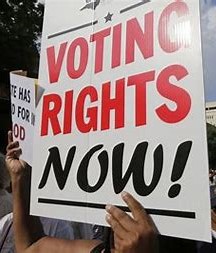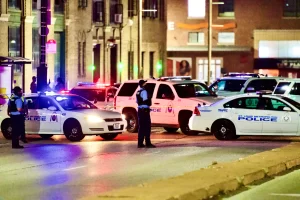Published by Capital City Hues, July 24, 2023

This year marks the 10th anniversary of Shelby County v. Holder decision. To bring you up to date, this was another one of the U.S. Supreme Court’s ruling that reflected its disdain for democracy. The decision gouged out the heart of the historic Voting Rights Act, signed by President Lyndon Johnson in 1965. Fears of a tidal wave of voter suppression turned into more than a feeling. The results have been devastating and voter rights advocates have been fighting tirelessly ever since.
Before the passage of the VRA, Black folks were forced to engage in the silly, racist games of voter registration in the South. If memorizing the U.S. Constitution, guessing the number of jellybeans in a jar or paying a poll tax did not disqualify you, the brutal violence might discourage. Black people who were actually successful in getting registered and attempted to vote were often beaten or murdered. Their homes were burned down, they lost their jobs, and they were kicked off their land.
Nevertheless, Black folks persisted.
In 2013, Justice Antonin Scalia called the VRA a “perpetuation of racial entitlement.” This was Scalia’s forever go-to phrase that he used to pervert any real effort towards racial equity and racial equality. Of course, he used it to explain away the need for affirmative action.
The section that was gouged out of the landmark civil rights legislation was Section 5, better known as pre-clearance. What this key measure did was to require federal approval for any voting changes for those states with an unfair pattern of racial discrimination and violence when it came to voting. Once gutted, the return to pre-1965 conditions was swift.
In the last decade, over half of the states in the country have passed nearly 100 laws that made it more challenging to cast a ballot, especially for communities of color. Voting registration barriers took the contemporary forms of voter ID laws, obstacles to voting by mail, closing of voting sites in certain communities, reduction of voting hours — to name a few. Conservative legislatures even took the extraordinary measure to criminalize the distribution of snacks and water to voters waiting in the long lines ironically created by voter suppression efforts.
Regaining lost ground has been an uphill battle. A couple of years ago, SCOTUS weakened Section 2 of the VRA which severely curtails legal challenges against restrictive voting laws. The Democratic National Committee brought a lawsuit against Arizona’s election policies and lost.
The Republicans took voter suppression to new depths. The GOP began taking over secretaries of states, state attorneys generals and county election offices to ensure a re-election victory for a desperate trump. Voting officials were bribed and bullied to overturn the 2020 presidential election results amidst the crazy cries of a stolen election.
It looks like the cavalry may have arrived in Michigan. The state attorney general has brought charges against 16 electors who conspired to overturn the presidential election. In Georgia, Fulton County District Attorney Fani Willis is contemplating filing charges after the investigation into trump’s call to the secretary of state to “find” some votes for him.
Democracy-loving voters can urge their Congresspeople to pass the Freedom to Vote Act and the John Lewis Voting Rights Advancement Act. We have some real work ahead if there’s to be fair and open elections in 2024.



